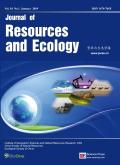Ecological Compensation Assessment from the Perspective of Spatial Game: a Case Study of the Watershed Ecological Compensation in Anhui Section of the Huaihe River Basin, China
Q3 Environmental Science
引用次数: 0
Abstract
The ecological environment has been the favorite subject of ecological security with the aim of ecological restoration, development and utilization. Therefore, a spatial game model was constructed according to the theory of spatial production and the spirit of game theory. Then the methods of Factor Analysis and Multivariate Analysis were used to verify the actual situation of watershed ecological compensation satisfaction in Anhui section of the Huaihe River Basin. The results show that: (1) Government management is still the dominant player in the spatial game, and the satisfaction of both market governance and social governance have significant impacts on its overall satisfaction; and (2) To improve the satisfaction of the spatial game, it is necessary to strengthen its cost control, face up to the status and role of its behavior subjects, and accurately recognize its target groups. The results of this study are helpful for deepening our understanding of watershed ecological compensation, and three viewpoints obtained based on the research results are: creating a new pattern of multiple collaborative constructions, highlighting the new implications of cost co-governance and consolidating the new demand of benefit sharing.空间博弈视角下的生态补偿评价——以淮河流域安徽段流域生态补偿为例
以生态恢复、开发和利用为目标,生态环境已成为生态安全研究的热点课题。因此,根据空间生产理论和博弈论精神,构建了空间博弈模型。运用因子分析和多元分析的方法,对淮河流域安徽段流域生态补偿满意度的实际情况进行了验证。结果表明:(1)政府管理仍是空间博弈的主体,市场治理满意度和社会治理满意度对政府管理总体满意度均有显著影响;(2)要提高空间博弈的满意度,需要加强其成本控制,正视其行为主体的地位和作用,准确识别其目标群体。本文的研究成果有助于深化我们对流域生态补偿的认识,并在此基础上得出三个观点:构建多元协同建设的新格局、凸显成本共治的新内涵、巩固利益共享的新需求。
本文章由计算机程序翻译,如有差异,请以英文原文为准。
求助全文
约1分钟内获得全文
求助全文
来源期刊

Journal of Resources and Ecology
Environmental Science-Ecology
CiteScore
2.40
自引率
0.00%
发文量
107
 求助内容:
求助内容: 应助结果提醒方式:
应助结果提醒方式:


